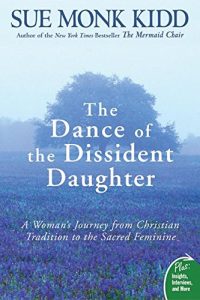 First off: holy wow, but The Dance of the Dissident Daughter has a long title.
First off: holy wow, but The Dance of the Dissident Daughter has a long title.
Second off: I know, I know, there are all kinds of reasons why it’s bizarre that I read this book. I’m not so much a woman, nor am I steeped in Christian tradition, nor do I spend very much time with non-fiction, outside of the historical. But I was asked to, and I said I’d give it a try, and here we are. So.
It turns out that once upon a time, the author of The Secret Life of Bees (which is a book about which I know essentially nothing, but I bet you’ve heard of it, too) mostly wrote in the thriving world of inspirational Christian books, a world that was alive and doing very well long before Left Behind burst onto the scene.[1] And then one day, which would far more accurately be portrayed by me as over a series of several months and years, she realized that her religion as it is practiced in her church and by most people she knew, and not incidentally in a way that also matches my experience on the topic, is really not very good for women. They are made to feel inferior by words both spoken and left out, by numerous deeds, and by unavailability of responsibility and influence. And after she realized it, she started taking steps to repair her life. And after she had repaired her life to her satisfaction, she wrote a book in the hopes that other women out there could also get a little bit of the same kind of repair.
Me, then, not so much the target audience. My responses are many and varied and far too extensive for the scope of this review, even were I inclined to try to present them all. But they are certainly colored by the fact of feeling so far outside. That is, so many of the complaints that she had about the church as a monolithic entity (which it is of course not, but in many ways it acts enough as one to move the discussion forward with and handwave that of course there are exceptions) were highly similar to experiences I’ve had, in which the self is devalued at the expense of the group and of tradition. Some of these complaints were specifically related to being a woman, of course, but many were not. And yet the book is very explicitly and throughout addressed just to women instead of to everyone. But at the same time, it’s really difficult for me to validly complain about being the excluded gender in this book when I’m the included gender in the majority of books out there, especially here noting the Bible in this category. I guess if I were the kind of person who hasn’t internalized the inherent correctness of gender equality, this could have been some kind of important wake-up call?
Anyway, that’s a sample reaction to the book. Feel free to discuss it with me in person, and I’d expect to be able to come up with others. It was, in any event, a very interesting book wherein I got to have a conversation about a lot of things that are typically well outside my experience. The author has some written tics that bothered me from time to time, as I’ve said about previous things I’ve read. In this case[3] as in those, it was rarely an important issue, just something that buzzed around my head from time to time. On the whole, feel free to read it. There could be something there for you. Certainly the moreso if you’re a Christian woman who is open to the idea that chicks are as good as dudes.[5]
[1] You know, I never did finish that series, and I regularly forget I ever read most of them. They were way worse than Narcissus in Chains, but failed to trigger the sin of unmet expectations in my head. So, oops on that?[2]
[2] My hand to, um, God, that statement was not intended as a sop. It’s just on my mind now.
[3] She would be talking about an event, and state that as the event was happening, it occurred to her that it tied in to this other previous event or to this metaphor that she’d recently been considering regarding her spiritual changes.[4] And the thing is, I’m sure that happened sometimes, but she says it so often that I eventually became unwilling to believe it really happened right then, and not far later as she was gathering her thoughts and her notes in order to tell her story. I try to be a fairly thoughtful person about my actions and motivations, but I’m not always on like she would have to have been. (And she certainly might have been anyway, it’s just so far outside my experience that it grew to bug me.)
[4] I feel so petty even complaining about this! But is it genuine pettiness, or is it gender-guilt? You decide! (I think it’s genuine pettiness, for my part.)
[5] I’ve gotten in trouble for saying this before, so I feel obligated to clarify. “as good as” can be taken as loaded language, but I don’t believe it to be so. Our societal problem is that men are perceived as being more valuable (your quantifiable or qualifiable scale of choice here) than women. Changing that perception necessarily, I would claim, requires that the value placed on women rises. The value placed on men could instead fall, but there are all kinds of psychological and sociological reasons why I feel that would be the lesser of the two choices.